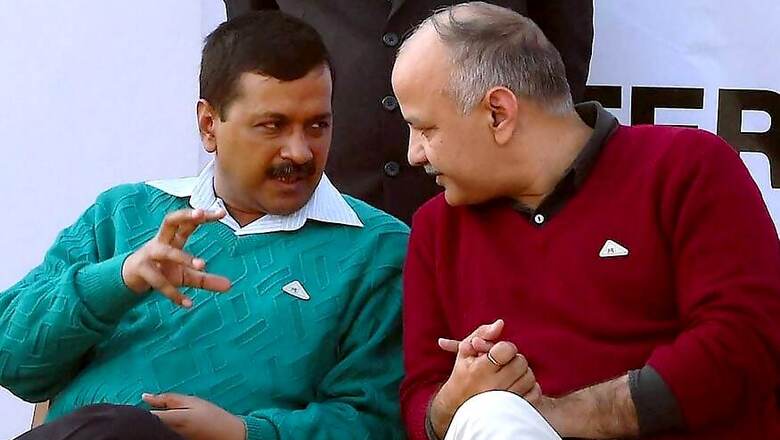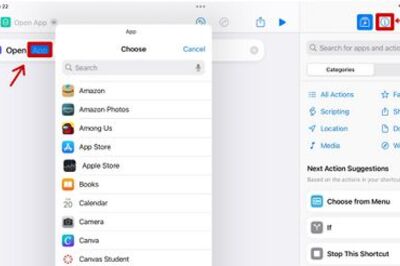
views
New Delhi: While the Aam Aadmi Party (AAP) highlighted quality education as one of the key achievements in its five-year report card, experts say that its Pragati Series – supplementary books introduced by the Delhi government – has, in fact, brought down the learning standards by “compromising” the content and “oversimplifying” it.
Immediately after coming to power in February 2015, Chief Minister Arvind Kejriwal had made it clear that education would be one of his top priorities. During school summer vacations in 2016, government teachers and people from Pratham, an NGO, sat together, brainstormed and came up with supplementary learning material that was meant to improve the quality of education in Delhi schools.
But educationists say that Pragati Series “trivialises the content” and has “reduced teaching to pointers instead of giving a complete picture of the subject”. The mentor teachers and the core group behind these textbooks have, on their part, defended the books, saying they suit the socio-economic background of the students and they have contextualised the texts to improve learning levels.
As Delhi votes today, News 18 brings to you both sides of the argument on the Pragati Series books, which were introduced as supporting textbooks and are used along with NCERT books to simplify learning material.
What is Pragati Series?
In 2015, the Department of Education conducted a baseline assessment and revealed astonishing figures on the learning levels of the students in 1,000-plus government schools.
“Almost 60% could not read the class appropriate text,” said Anju Ghavri, lecturer commerce, department of education, who has been a mentor teacher in government schools.
To understand why students were performing so low on basic skills, the state government conducted a workshop in 2016 and found that NCERT textbooks were not setting the context for children, who were finding it difficult to re-contextualise.
It was then decided that teachers themselves will help develop the support books, keeping in mind the socio cultural backgrounds of students.
“The government schools are a cauldron of students from diverse social and economic backgrounds. A government school located in Najafgarh is different from one in Kalkaji area. Keeping this mind, it was decided that teachers in the government school who are in touch with ground realities develop the supplementary textbooks, to be taught along with NCERT to contextualise the material,” said the Ghavri.
The Delhi government also roped in NGO Pratham for the project, a move that has been criticised by the educationists.
"To assume that students from a particular socio-cultural background will not be able to study NCERT textbooks is promoted by the NGOs. We need to have better prepared teachers who can deal with socio-cultural diversity in the classroom rather than oversimplification of textbooks. Even if supplementary support is required it should not be dumbed down," said a teacher educator on grounds of anonymity.
‘For Better Grip of Concepts’
“The focus is on assisting children to understand concepts. It is about communication. The children get the same content, as is there in the textbooks, in a simple language and with examples that they can relate with,” said Shailendra Sharma Principal Advisor to Director Education at Directorate of Education.
Sharma said this initiative does not take away the NCERT textbooks from classrooms, it only brings in supplementary material for students from class 6 to 8 in five subjects — Social Science, English, Hindi, Mathematics and Science. The series has been updated after feedback from teachers over three years and will be updated for the seventh time in 2020-21. They are not on sale and are provided free of cost in government schools.
The teachers mandatorily use it along with NCERT textbooks for Nishtha section. As part of its ‘Chunauti’ scheme, the Delhi government introduced two categories — Nishtha, for students who need improvement and Pratibha, for those who are performing well.
The segregation of students was justified by the government on improving adhering to learning needs of students and teaching accordingly. The step was criticised as being discriminatory of students and plea was filed against it in the Delhi High Court.
The AAP government has said that if elected back to power, it will further work on To simplifying education and learning with a video series, as a lot of schools are connected with GIAN, a digital learning initiative by the central government.
Another mentor teacher who is part of updating the Pragati textbooks said the whole exercise is meant to keep the learning in line with ground realities of students who had difficulty in reading, identifying letters, etc.
Quality Compromised?
Experts accuse these books of spoon-feeding students and not allowing them to develop the ability to analyse, imagine and think. “It is a very simplistic way of teaching social sciences. There is no sequence, it is not helping the child to develop abilities to analyse, imagine and think,” said Anita Rampal, former Dean of the Faculty of Education.
“It is important for students to understand how historians piece together knowledge from diverse authentic sources or how they learn about differently societies through social science.”
She also finds it “damaging” that the texts were “oversimplified” to ostensibly suit the socio cultural background of poor students coming to government schools, and added, "That's not true at all. Children from challenging circumstances grapple with social realities and understand life much better."
Rampal said the material is not in the spirit of the National Curriculum Framework (NCF), particularity the way it deals with history. “In the subject of history, there is no development of the sense of time or the understanding of continuities or discontinuities in the way it is taught through the Delhi government’s supplementary textbooks.”
The first view versiions of the series, she said, were patchy, with questions answered straight from the textbooks.
For instance, a chapter, titled ‘Arrival of East India Company’ in the class 8 support material narrates the important events in bullet points. It doesn’t built a form background of the subject and fails to give a step-by-step detail of the events that led to the East India Company’s arrival. It simply states that “Vasco Da Gama came to India in 1498. He was the first European who came to India via sea route.”
On the other hand, the NCERT gives a detailed description of the “Mercantile” class trading and puts together the fall of the Mughals and what lead to the Battle of Plassey.




















Comments
0 comment